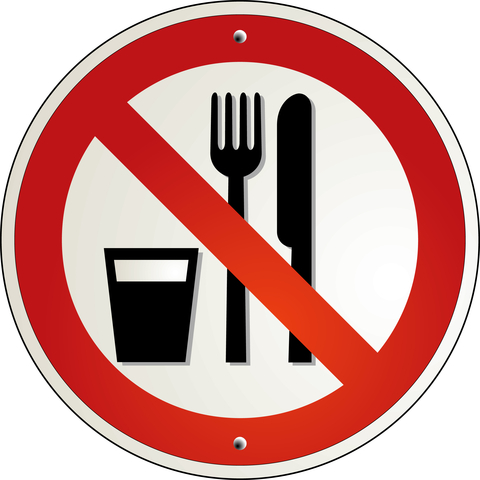by: Dr. Craig A. Maxwell

The United States Food and Drug Administration was founded to protect you from contaminated food and dangerous drugs. Unfortunately, it’s been allowing much more harmful synthetic chemicals into our food supply than it should. Below is a list of the ten most common foods that have been banned in other countries due to their incredible health risks.
Americans are Much Sicker Than in Other Wealthy Countries
Since 1980, the health of Americans has steadily declined and it’s getting worse every year. According to a report published by the National Research Council and Institute of Medicine, even college-educated Americans with health insurance are at the very bottom or near-bottom of other wealthy nations.
This report shows that Americans are at greater risk for:
- Premature Birth, Low Birth Weight, and Infant Death
- Teenage Pregnancy and STDs
- Prevalence of HIV and AIDS
- Deaths Due to Drug Overdose
- Murder or Injury
- Diabetes and Obesity
- Heart Disease
- Chronic Lung Disease
- Disability
In the late 1970s, early 1980s, the synthetic sweetener, aspartame hit the market, more vaccines were introduced, and genetically modified foods began silently infiltrating our food supply. While these facts may not explain teenage pregnancy or STDs, I strongly believe it explains the rest.
These Foods Have Been Banned in Other Countries
1. Genetically “Beefed Up” Dairy Products
“Got milk?” I actually remember a time when milk was whole and fresh, delivered straight to your door. There was no pasteurization and certainly nothing artificial. Fast-forward to the 21st century and milk-producing cattle are injected with a growth hormone called rBGH, which, get this, is derived from genetically-modified E. coli bacteria! Thirty nations have banned this additive because research has shown it converts healthy cells into cancerous ones, skyrocketing rates of colon, breast, and prostate cancer.
2. Chemically-Enriched Bread
Have you ever read the label on a loaf of bread? Canada, China, and the European Union has banned a common chemical called potassium bromate because it has been linked to the development of thyroid disease, nervous system damage, gastrointestinal problems, and cancer.
3. Arsenic-Laced Chicken
US-produced animal feed has been laced with arsenic to cause animals to grow faster and their meat to look “pink and fresh”. The European Union has banned use of arsenic in animal feed because this organic compound can turn to an inorganic compound, which leeches into and contaminates drinking water.
Excessive inorganic arsenic exposure has been shown to cause kidney damage, anemia, low blood pressure, headaches, neurological deficits, weakness, and liver malfunction.
4. Processed Food and Artificial Food Dyes
 There are an incredible 3,000 artificial food dyes and preservatives used in food sold in the United States that other countries have completely banned. Food dyes such as Red 40 and Yellow 5, which have been found in everything from boxed macaroni and cheese to Jell-O, have been linked to the development of neurological problems in children. Many of these foods have also been labeled as “known carcinogens”.
There are an incredible 3,000 artificial food dyes and preservatives used in food sold in the United States that other countries have completely banned. Food dyes such as Red 40 and Yellow 5, which have been found in everything from boxed macaroni and cheese to Jell-O, have been linked to the development of neurological problems in children. Many of these foods have also been labeled as “known carcinogens”.
5. Asthma-Drug-Tainted Meat
Ractopamine is an asthma drug that has been used in the meat supply since 1998. This beta-adrenoceptor agonist artificially “plumps” the animal, making it look as though it’s ready for sale before it actually is. This drug can also be used to make sicker, weaker animals that should be discarded look healthy enough for sale. Ractopamine has been banned in 160 different countries due to its link to reproductive disorders, behavioral disorders, and cancer.
6. Farm-Raised Salmon
If you saw what farm-raised salmon actually looked like before it was injected with synthetic astaxathin, you’d never touch it. Farm-raised salmon are the most harmful type of fish to eat. These fish are fed a diet of genetically-modified grains containing harmful pesticides. The small tanks they’re kept in are shocked with high levels of antibiotics to kill off disease that would surely develop in these cramped conditions.
The result are grey-skinned, sickly-looking fish that need synthetic chemicals to make them look saleable.
Farm-raised salmon has been shown to cause chronic digestive problems, neurological problems, allergies, kidney malfunction, and even cancer. This is why it has been banned from sale in Australia and New Zealand.
7. Genetically-Engineered Papaya
The more genetically-modified foods the United States produces, the more bans go up. Genetically-modified papaya is no exception. GMO foods like corn and soy have been shown to cause multiple-organ damage, massive tumors, birth defects, premature death, and sterility by the third generation in laboratory animals. The European Union does not trust the safety of any genetically engineered food and has therefore banned them.
8. Flame-Retardant Drinks
When it comes to soft drinks, it isn’t only obesity-causing high fructose corn syrup, and neurotoxic aspartame you should be avoiding. A synthetic chemical called brominated vegetable oil (BVO), originally patented as a flame retardant, is also hidden in your soda. BVO is soybean oil bonded with a toxic element called bromine. It has been banned in Europe and Japan because it accumulates in human tissue and breast milk, which has been shown to cause fertility and behavioral problems.
9. Olestra/Olean
You may remember snack chips coming out with a new type of cholesterol-free oil called Olestra or Olean. Though few snack manufacturers still use this dangerous fat substitute, countries like the UK and Canada aren’t taking any chances. It has been shown to cause leaky bowels, intestinal cramping, diarrhea, and malabsorption of nutrients. Thus, it has been banned.
10. BHA and BHT
BHT and BHA are carcinogenic preservatives found in your child’s cereal, chewing gum, synthetic “butter” spreads, meat, and beer. BHA has been known to trigger allergic reactions and behavioral problems in children.
Avoid Banned Foods and Be Healthy
When you read something like this, it’s easy to feel betrayed by the Food and Drug Administration, which was founded to keep you safe. Since these dangerous ingredients are in many of the foods you may consume every day, it is important to be your own best health advocate.
The best way to avoid consuming foods banned in other countries is to become a label reader. Familiarize yourself with the most harmful food additives like the ones mentioned above, and strike them from your diet.
Most highly-processed foods contain hundreds of synthetic ingredients that are best avoided if you want to achieve optimum health. Eat organic whenever possible. Organic produce, beans, legumes, meat, poultry, fish, and dairy products do not contain these dangerous chemical additives.
If you are unable to find an organic version of your favorite food, be sure to carefully read the label to check for additives you can’t pronounce.
Fish is especially important. The label won’t read “organic” but it will read “wild-caught”. Wild-caught fish such as Alaskan and sockeye salmon, cod, mackerel, and tuna are best for your health. If the label says, “farm-raised”, put it back.

Each time you go to the farmer’s market or the grocery store, you’re voting with your wallet. The less money you spend on foods that are banned in other countries, the more you will be sending a clear message that you and your family deserve better.
Resources:









I want your web blog , I actually many userful stuff here of information
Hello,
Please join us at http://www.AskDrMaxwell.com and sign up for our free twice-weekly natural health newsletter.
Dr. M